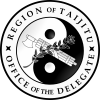Difference between revisions of "Template:Current featured article"
Funkadelia (Talk | contribs) |
|||
| Line 1: | Line 1: | ||
| − | [[image: | + | [[image: DelegateSeal.png|left|100px|Seal of the Delegate of Taijitu]] |
| − | The ''' | + | The '''Delegate of Taijitu''' is the head of government and de facto head of state of [[Taijitu]]. They are charged under the region's constitution with upholding both the constitution itself and any other laws. They are assisted in this task by an appointed cabinet of ministers. The constitution also provides that the delegate is the commander in chief of the armed forces and may negotiate treaties with foreign powers, veto legislation of the Senate and nominate justices to the Court. Unique among government offices, the delegate also holds power in-game, voting on behalf of the region in World Assembly resolutions. They are elected every seven weeks alongside the Senate by an instant runoff vote on the same ticket as a vice delegate who assumes the delegate's office if they become unable to serve. The most recent elections were concluded on April 1, 2012 and the current delegate is Gulliver. |
| − | + | There has always been an office of the delegate in Taijitu with executive powers. The precise nature of the office and its powers and limitations thereof has, however, changed over time. The Delegate's powers were originally modeled on those provided under the Lexiconian government. Like their modern counterpart, the delegate was the head of the executive branch and responsible for administering the government of the region, but unlike the current delegate they were elected by a plurality and permitted to hold a seat in the Senate, though forbidden to vote except to break any ties. They also had no power of veto over the Senate. | |
| − | + | :Main article: [[Delegate of Taijitu]] | |
| − | + | ||
| − | :Main article: [[ | + | |
Revision as of 13:18, 23 April 2012
The Delegate of Taijitu is the head of government and de facto head of state of Taijitu. They are charged under the region's constitution with upholding both the constitution itself and any other laws. They are assisted in this task by an appointed cabinet of ministers. The constitution also provides that the delegate is the commander in chief of the armed forces and may negotiate treaties with foreign powers, veto legislation of the Senate and nominate justices to the Court. Unique among government offices, the delegate also holds power in-game, voting on behalf of the region in World Assembly resolutions. They are elected every seven weeks alongside the Senate by an instant runoff vote on the same ticket as a vice delegate who assumes the delegate's office if they become unable to serve. The most recent elections were concluded on April 1, 2012 and the current delegate is Gulliver.
There has always been an office of the delegate in Taijitu with executive powers. The precise nature of the office and its powers and limitations thereof has, however, changed over time. The Delegate's powers were originally modeled on those provided under the Lexiconian government. Like their modern counterpart, the delegate was the head of the executive branch and responsible for administering the government of the region, but unlike the current delegate they were elected by a plurality and permitted to hold a seat in the Senate, though forbidden to vote except to break any ties. They also had no power of veto over the Senate.
- Main article: Delegate of Taijitu
